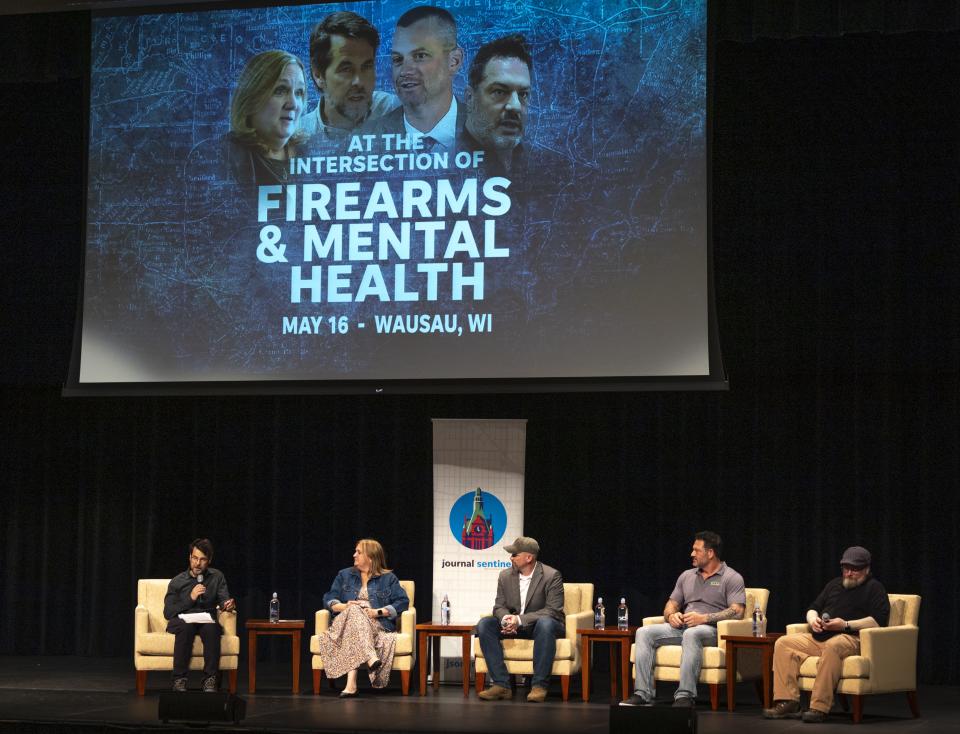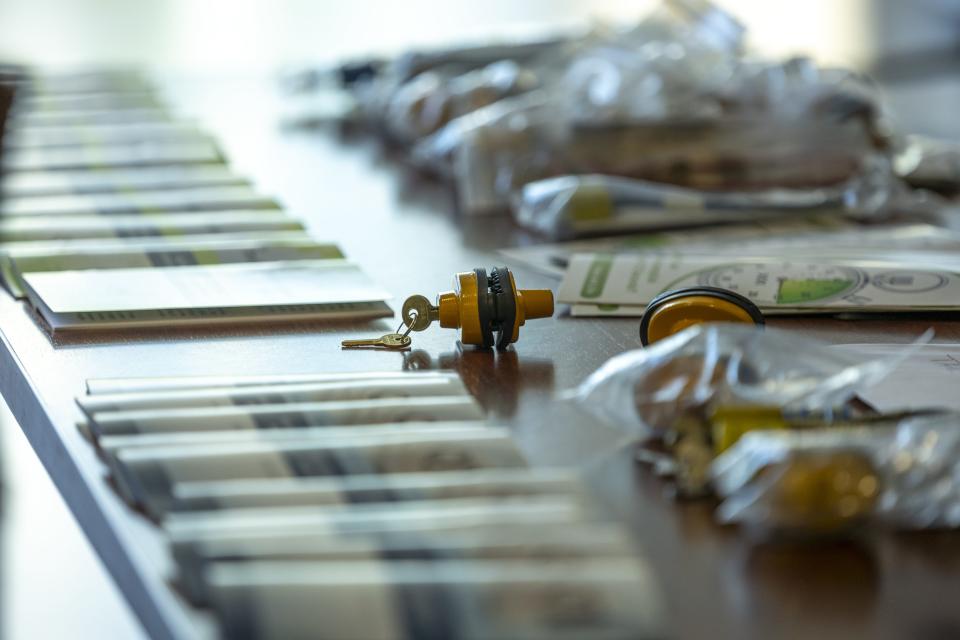Medical College of Wisconsin aims to curb suicides by collaborating with gun owners, veterans
If you or someone you know is dealing with suicidal thoughts, call the National Suicide Prevention Lifeline at 988, if a veteran then Press 1. You can also text "Hopeline" to the National Crisis Text Line at 741-741.
WAUSAU – The woman had a plan. First, she would go grocery shopping to stock the shelves for her family, then she would drive into the woods with a six-pack and her husband's rifle to end her life.
But as she backed out of her driveway — the woods to her right and a hospital to her left — she remembered the small kindnesses two college women paid her at the supermarket.
Though the woman had a plan, readying herself for it left her in shambles. She caught her coat in her car door in the parking lot, her purse toppled off her shopping cart and its contents spilled everywhere, she was flustered at checkout. At each step, these two college students helped untangle her, pick up her belongings and bring her groceries to her car.
"She got to the end of the driveway and she told me, 'I had a decision to make. I was going to turn right and go into the woods, have a couple beers and say goodbye, or I was going to bring myself here,'" said Debi Traeder, who worked at Aspirus Health as the behavioral health community engagement specialist at the time. "And she said, 'I kept thinking about those two girls, how important they made me feel for just that little bit. So I drove myself to the emergency room.'"

The woman became one of Traeder's patients. She got help and went on to lead a healthy, happy life.
Traeder, who serves as chairperson of Prevent Suicide Marathon County, shared this story at the Journal Sentinel's town hall event "At the Intersection of Firearms and Mental Health" May 16 in Wausau. John Diedrich, the lead reporter of the award-winning, year-long series, "Behind the Gun," moderated the discussion.
A person is least likely to survive a suicide attempt if the means is a firearm. According to the Medical College of Wisconsin, firearm injury has nearly a 90% fatality rate. Meanwhile, in Houston, researchers made a startling discovery: nearly one in four gun suicide survivors said they deliberated for less than five minutes before their attempt.
That lethal swiftness of gun suicides is why the Medical College of Wisconsin is facilitating a program that literally puts safer gun ownership on the map.
The main goal is to help facilitate the Gun Shop Project in Wisconsin. At the project's core is the belief that gun shops can play a role in suicide prevention.
That might look like retailers offering temporary storage of firearms to people in crisis, learning how to support customers who appear to be in distress, or knowing when to avoid selling a firearm to a suicidal customer. Iterations of the Gun Shop Project have spread from New Hampshire to Colorado, and across Washington, New York, Virginia and Ohio.
In Wisconsin, the effort has been led by U.S. Army veteran and Park Falls gun shop owner Chuck Lovelace over the last seven years. So far, 44 firearm retailers and range facilities and seven law enforcement agencies in Wisconsin have volunteered to be part of the Gun Shop Project.
The program is not about taking guns away, Medical College of Wisconsin staff emphasized, but about arming gun owners with suicide prevention education and stronger gun safety options. Many program advocates are proud gun owners or have grown up around guns.
The program is a partnership between the college's Captain John D. Mason’s Veteran Peer Outreach Program and its Comprehensive Injury Center.
It will be funded by a $75,000 annual grant for the next four years, awarded by the state Department of Health Services as part of a Centers for Disease Control and Prevention effort to reduce suicide for at-risk populations by 10% over five years.
In addition, the Medical College of Wisconsin will receive an additional $25,000 to provide gun safes for retailers that don't have adequate storage and want dedicated storage for the program.
Slowing down impulsive decisions in crisis can save lives
Dr. Bert Berger is a clinical psychologist and division manager for the Milwaukee Veterans Affairs and director of the Captain John D. Mason program. He's been in the field of clinical psychology for more than 30 years and has watched the rapid climb in Wisconsin's suicide deaths since 2000.
He's had time to consider and develop interventions, and while he doesn't quite have all the answers yet, he knows suicide prevention requires a multi-pronged approach.
One aspect of the approach is to reduce access to lethal means when someone is in crisis. Firearms as a lethal means make up half of all suicide deaths in the general population and 70% of all deaths in the veteran community, Berger said.
Because research shows how impulsive gun suicides are, Berger said slowing down the time between thoughts of suicide and accessing a gun is crucial.
"It will save lives," Berger said.

Research around the world shows the effectiveness of this approach. Berger referenced studies out of rural areas of Asia and the Pacific Islands, where pesticides are the most common lethal means of suicide. When paraquat, a toxic pesticide, was introduced in Samoa, the suicide rate shot up. But once the country regulated the use of the lethal substance, suicide rates abruptly fell.
Similar events elsewhere, whether the introduction and control of coal gas in the United Kingdom or constructing bridge barriers in Australia and New Zealand, show that reducing access to common lethal means of suicide also reduces suicide deaths.
Still, this project's success depends on buy-in from firearms retailers, range facilities and law enforcement agencies. And because it's voluntary, outreach will be key.
Spreading the word
Mark Flower, a veteran peer support specialist with the Captain John D. Mason program and a U.S. Army veteran, knows far too well the connection between suicide and firearms.
"I've lost many folks, many (veteran) brothers and sisters, and some personal friends to this unfortunate situation that we live in," Flower said. "And so I really care."
He has the benefit of lived experience as a U.S. Army veteran. They know how devastating close proximity to a firearm can be for veterans in crisis. But they also know that convincing veterans and firearms retailers requires a specific approach, considering how volatile conversations around gun control can turn.

"(The program) is voluntary. We have two sides of the argument — and two extreme sides of the argument — surrounding all the Second Amendment stuff. But (the program) is about an individual taking responsibility on their own, for them to say, 'I'm going to let you hold this (gun) for me for 90 days or 60 days or 30 days, because I'm having a thing,'" Flowers said. "I like calling them 'things' because that's less stigmatizing as far as I'm concerned."
Neal Davis, community program coordinator for the Medical College of Wisconsin's Division of Suicide Research and Healing, will be reaching out to gun retailers and other facilities in rural areas of the state to talk about the importance of safe firearms storage when someone is going through a crisis.
In anticipation of communicating with firearms retailers, range facilities and gun owners more generally, he knew how important it was for him to be better acquainted with firearms. Davis took a course at Fletcher Arms Lake Country in Pewaukee in order to learn gun vernacular and best practices for using a firearm.
"That way, I don't come in there cold as a rookie with no background experience at all," Davis said. "I learned a lot, which will actually give me a lot of insight when I have these conversations. I'm able to speak more in detail about what's going on in that particular area, the culture, their firearm culture, within these rural areas."
The team has newly established a website, Live Today – Put It Away (www.livetodayputitaway.org), with resources on how to get involved with the Gun Shop Project and statistics on gun suicides. Law enforcement agencies, gun retailers and range facilities are encouraged to participate.
For suicide prevention educational materials, including a free packet of materials from the National Shooting Sports Foundation, email Info@LiveTodayPutitAway.org. To sign up for the Gun Shop Project, interested law enforcement, gun retailers and range facilities can visit the website or fill out the form online.
Natalie Eilbert covers mental health issues for the Milwaukee Journal Sentinel. She welcomes story tips and feedback. You can reach her at neilbert@gannett.com or view her Twitter profile at @natalie_eilbert.
This article originally appeared on Milwaukee Journal Sentinel: Medical College of Wisconsin aims to curb suicides by working with gun owners

